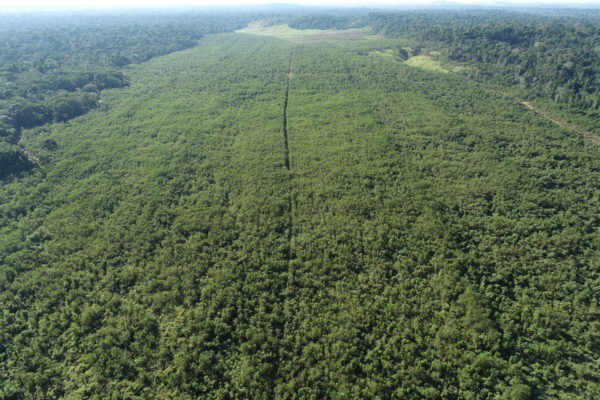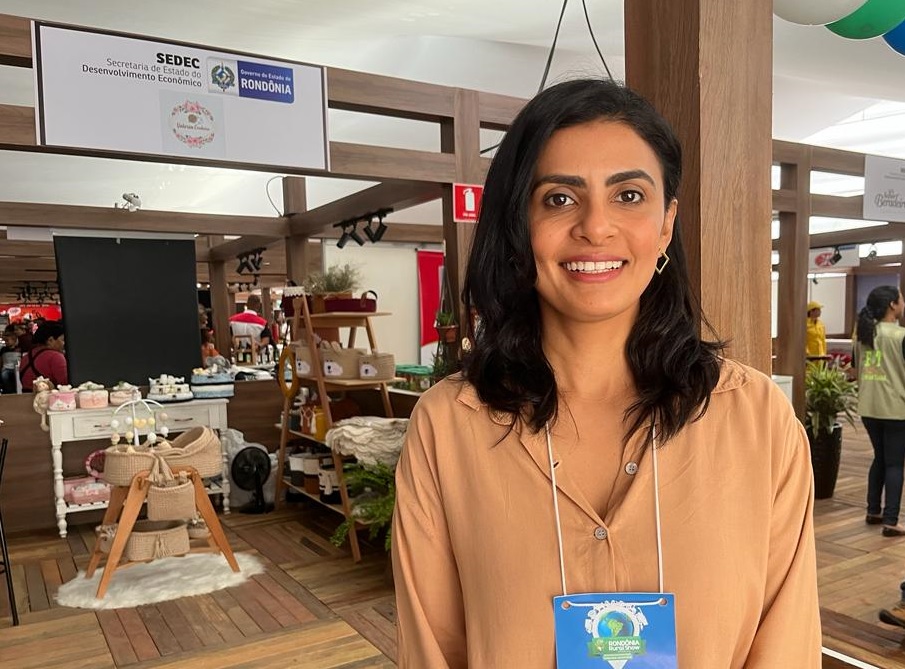São Paulo – In a world threatened by forest loss and global warming, a non-governmental organization based in the state of Rondônia, Brazil, carries out a persistent daily work against deforestation, bringing the forest back to where it belongs. Rioterra is dubbed the largest restorer of the Brazilian Amazon and is responsible for having restored 6,000 hectares.
Rioterra works with socio-environmental projects, and besides working on reforestation, it has supported the state of Rondônia in developing the climate change law that was approved late last year. Rioterra founding partner & president Fabiana Barbosa (pictured) gave an interview to ANBA during the Rondônia Rural Show, a multisectoral trade show that took place in Ji-Paraná last month.

The nonprofit was founded in 1999, and its work for restoring the Amazon has been developed for over 12 years. “Twenty-three years ago, a group of friends teamed up, and together we founded Rioterra. I was 17,” said Barbosa. The organization has three main areas of activity: reducing social vulnerability, preserving biodiversity, and mitigating climate change by incentivizing reforestation and keeping the forest standing. The ONG has received the title of public interest organization from the Ministry of Justice of Brazil.
“We’ve worked against social vulnerability because for understanding the importance of environmental and biodiversity conservation, those living in the forest first must have their basic needs met. The biodiversity conservation is the environmental area of activity, which now include lines of products where we can get more resources and investments,” said Barbosa.
The president said Brazil has made a series of agreements for being a country that emits several greenhouse gases due to deforestation. “Deforestation in Brazil is now the leading cause for greenhouse gases,” she said.
In 2020 the United Nations created the UN Decade on Ecosystem Restoration, which aims to work on forest restoration by 2030 in countries whose leading emissions are deforestation related. “Brazil made a series of agreements to be in line with this policy. Rioterra aligns all of its projects to this initiative, to the Sustainable Development Goals (SDGs) and climate agreements like the Paris agreement,” said Barbosa.
One of the projects by Rioterra is Foresting 4US, which aims to plant 50 million trees by 2030. The campaign looks to connect people and integrate actions for the reforestation of logged areas in the world’s largest tropical forest, the Amazon. The project has produced 7.5 million seedlings so far that were planted across 6,000 hectares.
The Rioterra nursery based in Porto Velho, the capital of the state, is capable of producing 2 million seedlings a year, and the seed collection for this production comes from a unit of federal conservation called Jamari National Forest, which is part of the Amazon biome.
The nursery holds 120 native species. Around five of them are endangered. They come from a bank of 600 geo-referenced trees in the Jamari Forest and other 300 seed-trees in private lands. “All these information is in a database. We know when our collectors harvested from each tree, how its health is, and other information,” she said.

“Each logged tree is a whole biome, you know,” stressed Barbosa. By conservating the forest standing and the restoration chain, animals come back, water returns, a whole biome is recovered.
Rioterra now has 120,000 small farms registered in its forest code device. “We need to recover areas of more than 90% [of these farms], and the global market is now in line with these international laws of the agreements we signed. The state needs to provide the conditions for these farmers to recover these areas and put their products on the market by meeting the requirements the global market is asking for,” he said.
Which is to say, there is no going back. Farmers need to access financial credits to produce and need to adjust their production, which the international market now asks to come from legalized, environmentally friendly and regulated areas. “So, having the restoration chain up and running is essential. I’ve worked with that for over 12 years, both on the restoration chain itself and the study of the climate change mitigation,” said Barbosa.
Vocation
“Small, medium and large farmers need to adjust to take its output overseas. This is the vocation of the state of Rondônia, and Rioterra has brought forth proposals to regulate farmers of any size and projects that bring economic income for them both in the restoration chain and carbon credit goals,” said the president.
As Rioterra developed this expertise and built up experience to understand what the carbon market and the restoration chain are, the state of Rondônia invited it to help develop the climate governance law that was approved last year.
“Now we move on to work groups to develop guidelines and standardize how Rondônia will take care of the carbon market, the payment for environmental services, and the restoration chain, so now we go on with this tool, of how this will work in the state, whether it’s for governments or private companies.”
International laws are urging actions, and forest conversion to production is frowned upon. But Rondônia has a well-established production, so what to do? Barbosa pointed out that the market asks for environmental regulation, the conservation of areas where there is water in farms, keeping the forest standing, reforesting illegally logged areas.
“And intensifying crops, arranging forest species and agroforestry systems, converting fertilizers, adding forest species, these are things that adds value, and most markets now require environmental regulation, ensuring that that product doesn’t come from an illegal area, an illegally deforested area. Including traceability is one of the technologies for environmental regulation. This makes production sustainable,” said Barbosa.
Income
Rioterra has two sources of income: government notices like the Amazon Fund, that was unblocked earlier this year, and private investments that come from private funds. Rioterra has recently received an investment of BRL 85 million from private funds to work on restoration projects – one related to carbon credits, particularly in restoration areas, and other to work on cocoa and carbon.
A third work model is blended finance. “If a project costs BRL 50 million, and [Brazil’s state development bank] BNDES funds 50%, and the organization seeks to finance the other 50% from private funds,” she said.
The journalist traveled at the invitation of Rondônia’s Secretariat for Economic Development (SEDEC).
Read more on Rondônia:
- Saboaria Rondônia makes natural and sustainable cosmetics
- Rondônia’s Castanhas Ouro Verde sells to Algeria
- Patrícia Olve, the queen of pirarucu leather
- Ice cream brand features native ingredients of Rondônia
- Cacaulândia: Chocolate from Rondônia named after city
- Sustainability could connect Rondônia to Arab countries
- Ascenergy sells Brazil’s largest drone for agriculture
- Fish, coffee, cocoa, açaí: Export potential of Rondônia
- Rondônia’s Amazon Robusta coffee more and more sustainable
- Rondônia Rural Show holds event to internationalize state
Translated by Guilherme Miranda




